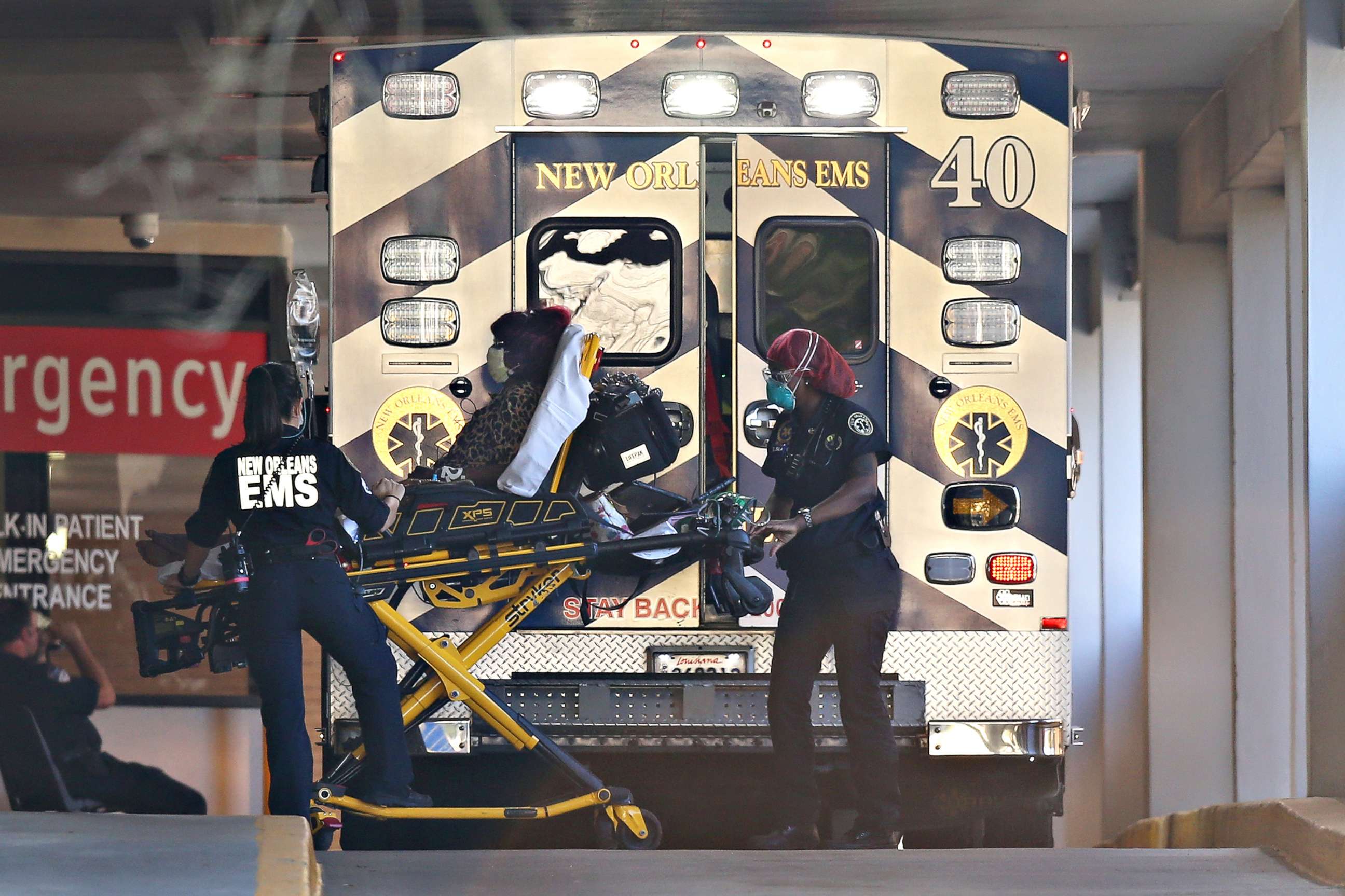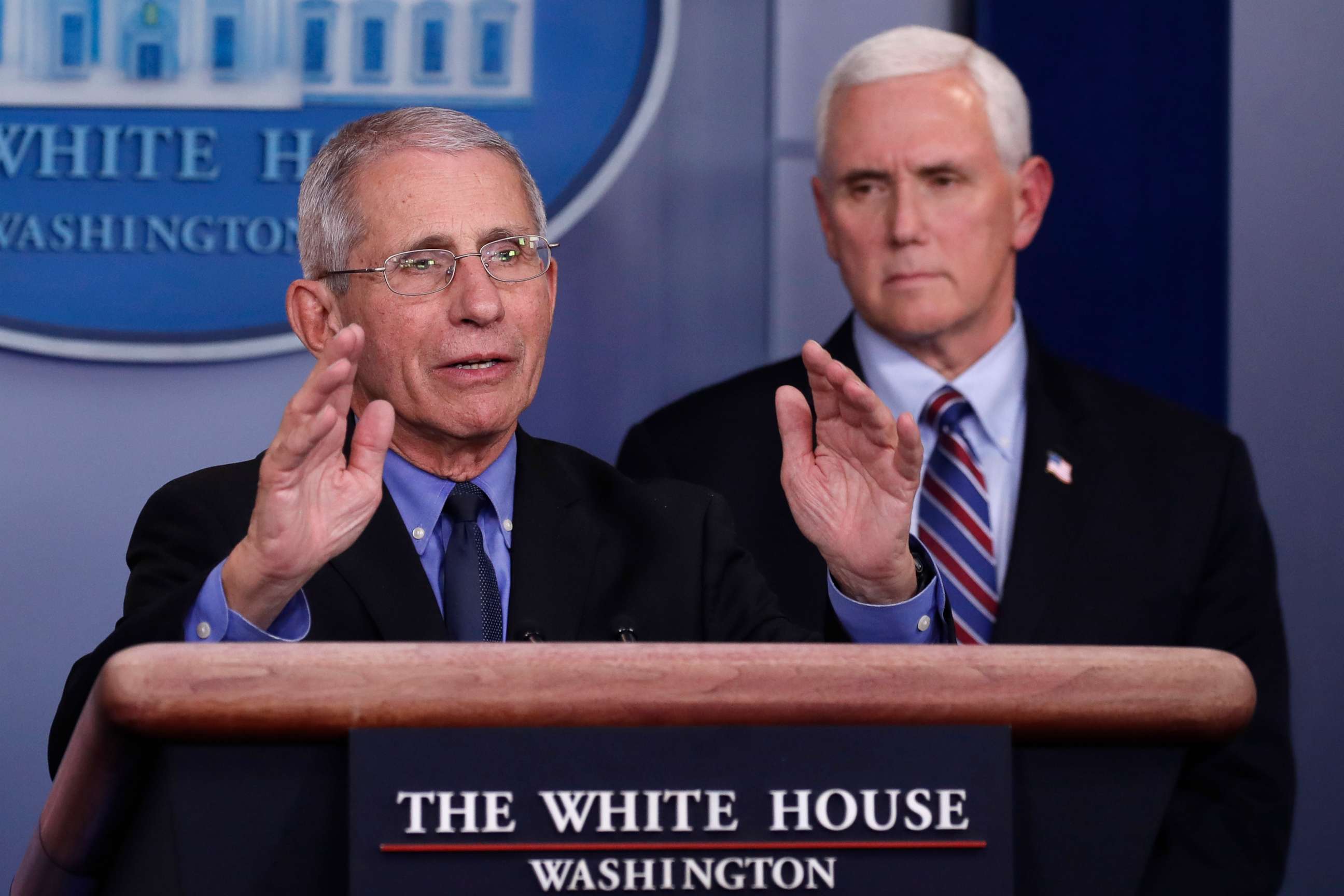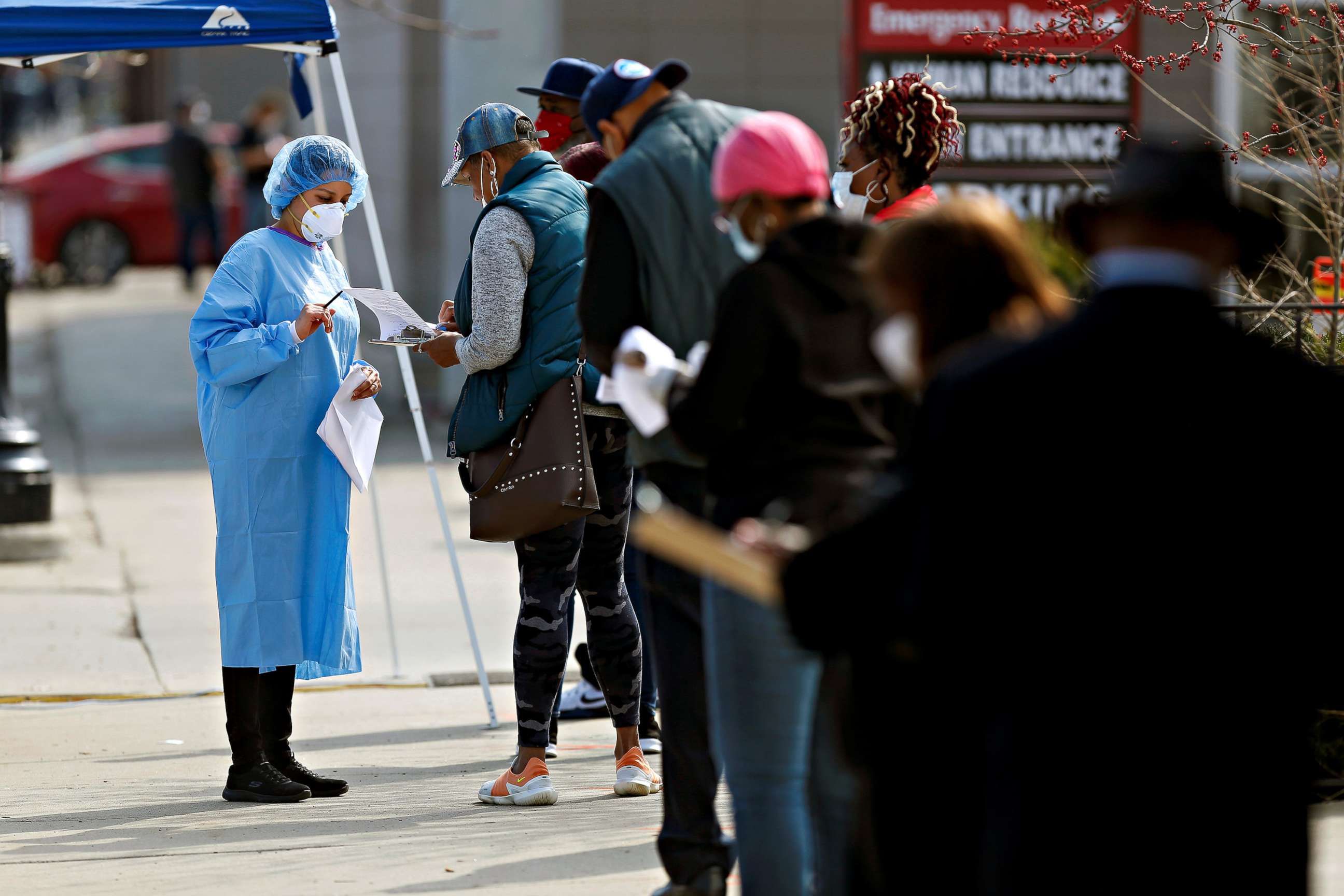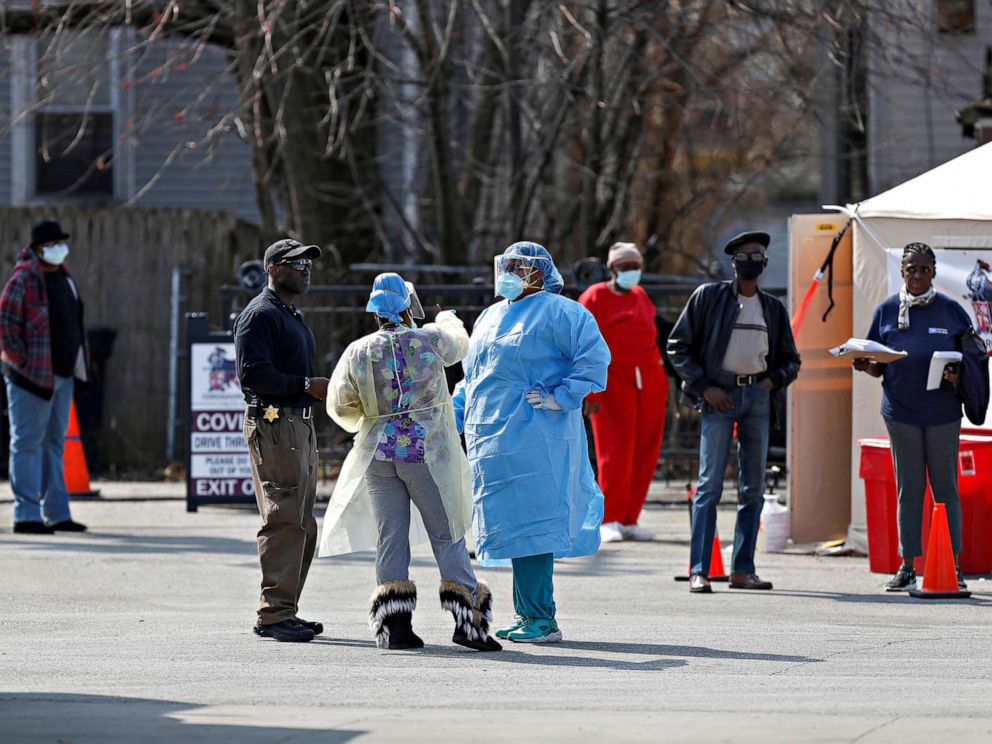Coronavirus is disproportionately killing the black community. Here's what experts say can be done about it
Numbers broken down by race have shocked the nation.
As the coronavirus continues to rip through the nation leaving behind thousands of victims in its path, black communities have been infected and their residents killed at a disproportionate rate across the country, according to several states' analysis of data.
“After this virus is done infecting… it will expose a lot of weaknesses in the health care system. The world will not be the same,” said Dr. Tyson Bell, a pulmonology and intensive care physician at the University of Virginia and medical director of the intensive care unit.
On Wednesday, the Centers for Disease Control and Prevention provided some limited data as political pressure to do so increased.
But while the portion of data released by the CDC did reveal racial disparities on a national scale, there were caveats. The data was pulled from a small sample size during a limited time frame -- 14 states during the month of March -- and race and ethnicity data was only available from 580 patients hospitalized for coronavirus, out of a total of 1,482 patients in the report.
According to the CDC, even though the racial breakdown from the population in the report was 59% white, 14% Latino and 18% black, 45% of hospitalized coronavirus patients were white and 8% were Latino, while 33% were black, "suggesting that black populations might be disproportionately affected by COVID-19."
Still, it's the largest amount of national data to have been provided so far -- and it sheds new light on racial disparities seen in cities and states across the country that have collected such data.
Some states had previously begun releasing numbers broken down by race on their own and the rates shocked the nation.
States reporting numbers by race for COVID-19 include Michigan, Virginia, Illinois, Minnesota, North Carolina, Arkansas and Louisiana. Some statistics raised alarms among health care professionals and community and government leaders that COVID-19 is affecting black communities disproportionately.
Louisiana released data showing that while African-Americans only make up roughly 32% of the population they account for 70% of the deaths in the state
“This is unprecedented. This has been a one of the hardest things I've ever had to do because you've got to get people to understand just how serious and devastating this thing is," said New Orleans City Councilman Jay Banks, who is also chairman of the historic Zulu Social Aid and Pleasure club -- a New Orleans-based Mardi Gras parade krewe -- which has lost six members to COVID-19.

Louisiana isn’t the only state facing these harsh realities. Chicago, Milwaukee and Minnesota are finding themselves battling a disease that is taking the lives of the most vulnerable in their communities.
In Michigan, African-Americans have died at more than eight times the rate of white people despite making up only 14% of the state’s population.
In Illinois, 58% of Cook County deaths from COVID-19 were black though the population is 23% black, and 72% of Chicago deaths were black patients though the city is 32% black.
Chicago Mayor Lori Lightfoot said “those numbers take your breath away”, and “[the statistics were] among the most shocking things I think I’ve seen as mayor”.
When the first reports of the COVID-19 outbreak surfaced from China, public health leaders feared if COVID-19 came to the U.S. it would devastate communities of color.
“We had initial concerns when we first saw the outbreak coming, particularly the early reports out of China, and we recognized this may be a problem for communities of color,” Dr. Georges E. Benjamin, executive director of the American Public Health Association and emergency medicine physician said. “You had early evidence from Asia that showed that older folks, older than 60 or 65, with chronic disease would do worse when they got the infection. So when you put that together with the understanding that in this country you already have a [black] population disproportionately affected by disparities in things like diabetes, heart disease and asthma, we understood that if those populations got infected they would be more at risk.”
Tune into ABC at 1 p.m. ET and ABC News Live at 4 p.m. ET every weekday for special coverage of the novel coronavirus with the full ABC News team, including the latest news, context and analysis.
Historically, black populations have been affected differently by the rapid spread of infectious diseases.
Benjamin drew parallels to how he witnessed the AIDS and opioid epidemics affect black communities as a frontline physician in the '80s.
“I was around in the early days of the AIDS epidemic and watched that one ravage communities… and even how the opioid epidemic ravaged communities of color”, he said. He noted that outbreaks devastating communities of color have been a repeated theme throughout history.
Dr. Anthony Fauci, immunologist and director of the National Institute of Allergy and Infectious Diseases since 1984, raised similar concerns saying in a press briefing at the White House Tuesday that the disproportionate amount of deaths in the black community remind him of his work during the HIV/AIDS epidemic.
“The greater proportion of my professional career has been defined by HIV/AIDS… African Americans dying at greater rates from COVID-19 could be a similar moment,” Fauci said.

Leaders in medicine, public health and legal fields have decried the lack of wide reporting of race statistics as a fundamental injustice and an issue that has contributed to issues in understanding the full scope and depth of the disease's impact on minorities.
“States are reporting data along lines of geography, gender and age-- there is no defensible reason for excluding racial demographic data. Our ability to fully understand and confront this pandemic requires and demands that we obtain racial data,” said Kristen Clarke, president and executive director of the Lawyers’ Committee for Civil Rights Under Law, an organization focused on addressing issues of inequity.
Benjamin said he received early reports from health officials around the country that people of color were dying at a higher rate, but not being able to find data.
“I got calls early on from some state health commissioners that they were seeing a disproportionate number of deaths in people of color,” Benjamin said. “When I initially went looking for the race information early on I couldn’t find it. At that point they were anecdotes and not evidence, but enough of them raise alarms.”
Unfortunately, without data to show where and how the disparities were happening, alarms could not be raised quickly enough.
Systemic barriers
While the country comes to terms with how to attack the coronavirus crisis head on, another widely known and unaddressed crisis is complicating the response: systematic racism within the health care system.
Fauci on Tuesday at a White House briefing said that these health disparities have long been prevalent in the African American community and that this pandemic is “shining a bright light on how unacceptable that is.”
A range of studies conducted by such organizations as the American Journal of Public Health and The Agency for Healthcare Research and Quality over the past few decades have shown black people are less likely to have insurance and access to affordable medical testing.
Black Americans are also more likely to have underlying conditions such as hypertension, diabetes, high blood pressure and asthma and if a patient with those underlying conditions gets a severe illness they tend to fare worse.
“It’s not that they’re getting infected more often,” Fauci said. “It’s that when they do get infected, their underlying medical conditions ... wind them up in the ICU and ultimately give them a higher death rate.”

Additionally, implicit bias within the health care system has long played a factor in the wellness of black Americans.
“Systemic racism and bias in the healthcare system have resulted in chronically poor health outcomes for Black Americans,” Kristen Clarke wrote in a letter Monday to the Department of Health and Human Services and the Centers for Disease Control and Prevention.
Studies looking at manifestations of racial bias within the health care system have found black patients are sometimes treated differently than whites, leading to things such as undertreatment of pain and racial differences in what treatment is offered for a heart attack .
“People are very leery of systems that don't benefit them,” Banks said while discussing how the rate of African American deaths is partly representative of a system that is highly entrenched with inequality. “People are very leery of systems that have been disparaging towards them their whole life and all of a sudden you're going to tell me you're gonna run in and save me when you haven't been trying to do that before,” Banks said.
He added, “It is not a talking point to bash some political party. The fact of it is that it's real. There's a definite disparity in medical care in this country, and people of color and poor people have less access to medical care, period.”
Where should the US go from here? Experts issue a government call to action
Health equity advocates and community leaders called out the federal government, as well as state and local health departments for their role in the coronavirus' disproportionately high impact in black communities.
“We need to know [race statistics] in order to allocate health healthcare resources more equitably. We call on HHS to mandate the collection or racial demographic data so that we can actually see the impact on our most vulnerable communities," said Dr. Uche Blackstock, founder and CEO of Advancing Health Equity, and emergency medicine physician.
Dariely Rodriguez, director of the Economic Justice Project at the Lawyers' Committee for Civil Rights Under Law, echoed the called for increased data disaggregated by race.
“We will continue to call on the federal government and state and local departments to increase transparency and to shed light on how communities of color are being impacted during this pandemic,” Rodriguez said. “There's absolutely no reason why we shouldn't be collecting data on race because we know that it's correlated with worse outcomes in certain communities, especially vulnerable communities. I think what's important to remember here is that our leaders get their power from the public, and they are accountable to us, and accountability ultimately requires transparency.”
Banks said that Louisiana Gov.John Bel Edwards is teaming up with local leaders across the state for target messaging to the black community.
The message: “This will kill you and kill people you care about. Period. You need to stay home, you have to."
A message to physicians and patients
Frontline physicians and public health leaders and health offered their perspective on what both physicians and patients can do when faced with the mounting COVID-19 disparities in communities of color.
“Interfacing with the health care system can be daunting for black patients given how they have been treated historically and in current-day. I would encourage patients to be as fully informed as possible about COVID19 symptoms and try to bring a family member or friend to advocate for them in healthcare settings. Additionally, physicians must be mindful that while they make think they are providing unbiased care, the data tells us otherwise. Implicit bias has been implicated as a factor in the racialized health disparities,” Blackstock said.
Benjamin offered that physicians considering the role of unconscious bias may be able to help change the trajectory.
“I myself have to always do a little introspection and think about my own unconscious biases, and raise my index of suspicion. I think [more physicians doing this] would help the inequities a lot,” Benjamin said.

He also suggested that if possible, black patients bring someone with them when seeking medical care to help be an advocate.
Bell said it's important for physicians to speak out if they identify systemic barriers, work to remove them, and don’t take no for an answer. He used the example of restrictive testing in his state early on that may have contributed to the COVID-19 outcome disparities.
“Early when Virginia was rolling out testing, we had a restrictive set of rules as to who could be tested or not,” Bell said. “We [at the University of Virginia] set up our own in house testing so that we didn’t have to depend on rules we didn't think were appropriate or broad enough to really get a good sense [of who needs testing] and protect our community. We didn't take no for an answer… and when barriers came up, we broke them.”
Nancy A. Anoruo, MD MPH is senior internal medicine resident physician with a focus on public health at the University of Massachusetts, and a former health disparities research fellow at the National Institutes of Health. Elizabeth K. Thomas is a White House reporter and producer at ABC News.
This report was featured in the Thursday, April 9, 2020, episode of “Start Here,” ABC News’ daily news podcast.
"Start Here" offers a straightforward look at the day's top stories in 20 minutes. Listen for free every weekday on Apple Podcasts, Google Podcasts, Spotify, the ABC News app or wherever you get your podcasts.




